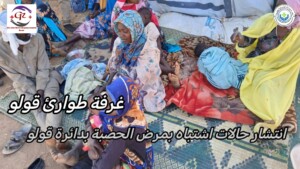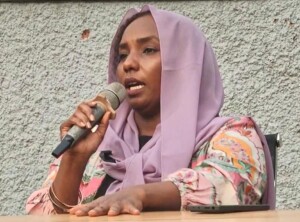Covid-19 in Sudan: 57 new cases recorded, food prices soar
On Wednesday, the Federal Ministry of Health reported 57 new coronavirus patients. Various states take extra measures to combat the spread of the infectious disease. The prices of food are skyrocketing.
 Sudan's Minister of Health, Akram El Tom (SUNA)
Sudan's Minister of Health, Akram El Tom (SUNA)
On Wednesday, the Federal Ministry of Health reported 57 new coronavirus patients. Various states take extra measures to combat the spread of the infectious disease. The prices of food are skyrocketing.
Most of the new cases, 55, were recorded in Khartoum. The other two new patients were registered in El Gezira, bringing the total number of cases since the beginning of the pandemic in Sudan to 375, including 28 deaths. 32 patients have recovered.
A total of 344 cases were registered in Khartoum, 19 in El Gezira, three each in El Gedaref and in River Nile state, while Red Sea state, Sennar, White Nile state, West Kordofan, Central Darfur, and East Darfur each recorded one case.
In a television speech, Minister of Health Akram El Tom lectured the Sudanese people about their disregard of the measures taken by the government since mid-March to ward off the spread of the Covid-19 pandemic.
He clearly expressed his worry about the growing numbers of infected people in the country, and told all to seriously heed the measures in order not to be infected or infect others.

More measures in the states
El Amara El Jazouli villge, east of Sennar town has been put in quarantine after the emergence of a coronavirus patient. The health authorities also decided to close the Shawir Rasak Market, located south of Sennar.
The government of White Nile state decided to extend the closure of the markets in the state for another 10 days, until Friday next week.
In Blue Nile state and West Kordofan, the authorities banned Ramadan gatherings and congregational prayers in mosques and other places.
The Ministry of Health and Population of River Nile state announced the isolation of the Wad Hamed area and El Matama locality for a period of 14 days. The measure was taken after an investigation of a deceased patient confirmed that he had been in contact with a number of people in the area.
Precautionary measures for the enture state include banning of prayers in mosques, the closure of markets and shops except for food and other basic needs, the closure of sports and social clubs, and the banning of gatherings for two weeks.
Soaring prices
People in all places in Sudan complain about large increases in food prices after the government banned traffic between the 18 states in the country – despite the exceptions made for vehicles carrying food and beverages.
“We now pay SDG 400* for a kilo of chicken. Fish costs SDG 800 per kg, while my husband’s monthly salary is just a bit more than SDG 4,000,” a housewife in Khartoum lamented. “A kilo rice or lentils costs SDG 300.”
The people in West Kordofan reported that the closure of the border crossings with South Sudan, and the banning of interstate traffic have led to “a huge increase in the prices of basic consumer goods”.
“In particular the prices of sorghum are soaring,” Kun Manged, deputy director of Abyei locality told Radio Dabanga. “A [100 kg] sack of sorghum in Abyei now costs SDG 18,000.”
On Tuesday, the UN High Commissioner for Human Rights expressed serious concerns about the crisis facing Sudan’s transition in the midst of the Covid-19 pandemic. She said that untold suffering awaits Sudan unless donors act fast.
* USD 1 = SDG 55.1375 at the time of posting. As effective foreign exchange rates can vary in Sudan, Radio Dabanga bases all SDG currency conversions on the daily middle US Dollar rate quoted by the Central Bank of Sudan (CBoS). In mid-April, the US Dollar traded SDG 147 on the black market in Khartoum.”
Radio Dabanga’s editorial independence means that we can continue to provide factual updates about political developments to Sudanese and international actors, educate people about how to avoid outbreaks of infectious diseases, and provide a window to the world for those in all corners of Sudan. Support Radio Dabanga for as little as €2.50, the equivalent of a cup of coffee.












 and then
and then